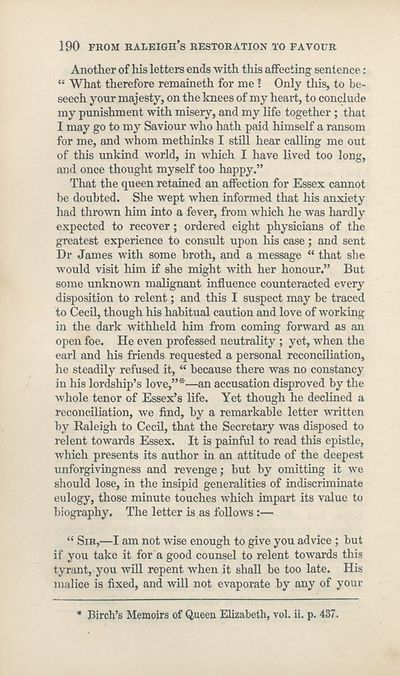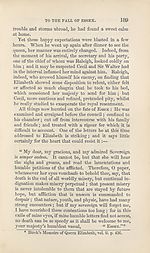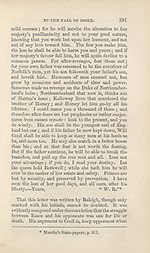Download files
Complete book:
Individual page:
Thumbnail gallery: Grid view | List view

190 from raleigh’s restoration to favour
Another of his letters ends with this affecting sentence:
“ What therefore remaineth for me 2 Only this, to be¬
seech your majesty, on the knees of my heart, to conclude
my punishment with misery, and my life together ; that
I may go to my Saviour who hath paid himself a ransom
for me, and whom methinks I still hear calling me out
of this unkind world, in which I have lived too long,
and once thought myself too happy.”
That the queen retained an affection for Essex cannot
be doubted. She wept when informed that his anxiety
had thrown him into a fever, from which he was hardly
expected to recover; ordered eight physicians of the
greatest experience to consult upon his case; and sent
Dr James with some broth, and a message “ that she
would visit him if she might with her honour.” But
some unknown malignant influence counteracted every
disposition to relent; and this I suspect may be traced
to Cecil, though his habitual caution and love of working
in the dark withheld him from coming forward as an
open foe. He even professed neutrality; yet, when the
earl and his friends requested a personal reconciliation,
he steadily refused it, “ because there was no constancy
in his lordship’s love,”*—an accusation disproved by the
whole tenor of Essex’s life. Yet though he declined a
reconciliation, we find, by a remarkable letter written
by Raleigh to Cecil, that the Secretary was disposed to
relent towards Essex. It is painful to read this epistle,
which presents its author in an attitude of the deepest
unforgivingness and revenge; but by omitting it we
should lose, in the insipid generalities of indiscriminate
eulogy, those minute touches which impart its value to
biography. The letter is as follows :—
“ Sir,—I am not wise enough to give you advice ; but
if you take it for a good counsel to relent towards this
tyrant, you will repent when it shall be too late. His
malice is fixed, and will not evaporate by any of your
* Birch’s Memoirs of Queen Elizabeth, vol. ii. p. 437.
Another of his letters ends with this affecting sentence:
“ What therefore remaineth for me 2 Only this, to be¬
seech your majesty, on the knees of my heart, to conclude
my punishment with misery, and my life together ; that
I may go to my Saviour who hath paid himself a ransom
for me, and whom methinks I still hear calling me out
of this unkind world, in which I have lived too long,
and once thought myself too happy.”
That the queen retained an affection for Essex cannot
be doubted. She wept when informed that his anxiety
had thrown him into a fever, from which he was hardly
expected to recover; ordered eight physicians of the
greatest experience to consult upon his case; and sent
Dr James with some broth, and a message “ that she
would visit him if she might with her honour.” But
some unknown malignant influence counteracted every
disposition to relent; and this I suspect may be traced
to Cecil, though his habitual caution and love of working
in the dark withheld him from coming forward as an
open foe. He even professed neutrality; yet, when the
earl and his friends requested a personal reconciliation,
he steadily refused it, “ because there was no constancy
in his lordship’s love,”*—an accusation disproved by the
whole tenor of Essex’s life. Yet though he declined a
reconciliation, we find, by a remarkable letter written
by Raleigh to Cecil, that the Secretary was disposed to
relent towards Essex. It is painful to read this epistle,
which presents its author in an attitude of the deepest
unforgivingness and revenge; but by omitting it we
should lose, in the insipid generalities of indiscriminate
eulogy, those minute touches which impart its value to
biography. The letter is as follows :—
“ Sir,—I am not wise enough to give you advice ; but
if you take it for a good counsel to relent towards this
tyrant, you will repent when it shall be too late. His
malice is fixed, and will not evaporate by any of your
* Birch’s Memoirs of Queen Elizabeth, vol. ii. p. 437.
Set display mode to:
![]() Universal Viewer |
Universal Viewer | ![]() Mirador |
Large image | Transcription
Mirador |
Large image | Transcription
| Antiquarian books of Scotland > Politics & government > Life of Sir Walter Raleigh > (196) |
|---|
| Permanent URL | https://digital.nls.uk/113654756 |
|---|
| Description | Thousands of printed books from the Antiquarian Books of Scotland collection which dates from 1641 to the 1980s. The collection consists of 14,800 books which were published in Scotland or have a Scottish connection, e.g. through the author, printer or owner. Subjects covered include sport, education, diseases, adventure, occupations, Jacobites, politics and religion. Among the 29 languages represented are English, Gaelic, Italian, French, Russian and Swedish. |
|---|

